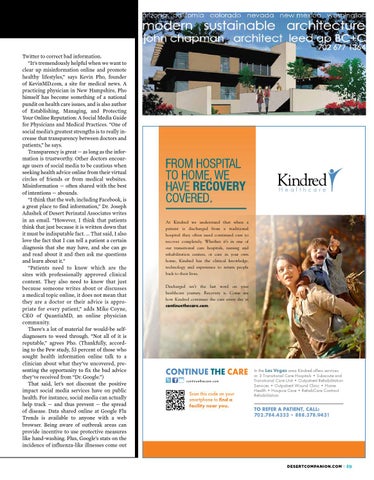Twitter to correct bad information. “It’s tremendously helpful when we want to clear up misinformation online and promote healthy lifestyles,” says Kevin Pho, founder of KevinMD.com, a site for medical news. A practicing physician in New Hampshire, Pho himself has become something of a national pundit on health care issues, and is also author of Establishing, Managing, and Protecting Your Online Reputation: A Social Media Guide for Physicians and Medical Practices. “One of social media’s greatest strengths is to really increase that transparency between doctors and patients,” he says. Transparency is great — as long as the information is trustworthy. Other doctors encourage users of social media to be cautious when seeking health advice online from their virtual circles of friends or from medical websites. Misinformation — often shared with the best of intentions — abounds. “I think that the web, including Facebook, is a great place to find information,” Dr. Joseph Adashek of Desert Perinatal Associates writes in an email. “However, I think that patients think that just because it is written down that it must be indisputable fact. ... That said, I also love the fact that I can tell a patient a certain diagnosis that she may have, and she can go and read about it and then ask me questions and learn about it.” “Patients need to know which are the sites with professionally approved clinical content. They also need to know that just because someone writes about or discusses a medical topic online, it does not mean that they are a doctor or their advice is appropriate for every patient,” adds Mike Coyne, CEO of QuantiaMD, an online physician community. There’s a lot of material for would-be selfdiagnosers to weed through. “Not all of it is reputable,” agrees Pho. (Thankfully, according to the Pew study, 53 percent of those who sought health information online talk to a clinician about what they’ve uncovered, presenting the opportunity to fix the bad advice they’ve received from “Dr. Google.”) That said, let’s not discount the positive impact social media services have on public health. For instance, social media can actually help track — and thus prevent — the spread of disease. Data shared online at Google Flu Trends is available to anyone with a web browser. Being aware of outbreak areas can provide incentive to use protective measures like hand-washing. Plus, Google’s stats on the incidence of influenza-like illnesses come out
FROM HOSPITAL TO HOME, WE HAVE RECOVERY COVERED. At Kindred we understand that when a patient is discharged from a traditional hospital they often need continued care to recover completely. Whether it’s in one of our transitional care hospitals, nursing and rehabilitation centers, or care in your own home, Kindred has the clinical knowledge, technology and experience to return people back to their lives. Discharged isn’t the last word on your healthcare journey. Recovery is. Come see how Kindred continues the care every day at continuethecare.com.
CONTINUE THE CARE continuethecare.com
Scan this code on your smartphone to find a facility near you.
In the Las Vegas area Kindred offers services in: 3 Transitional Care Hospitals • Subacute and Transitional Care Unit • Outpatient Rehabilitation Services • Outpatient Wound Clinic • Home Health • Hospice Care • RehabCare Contract Rehabilitation.
TO REFER A PATIENT, CALL: 702.784.4333 • 888.378.9431
DesertCompanion.com | 49
